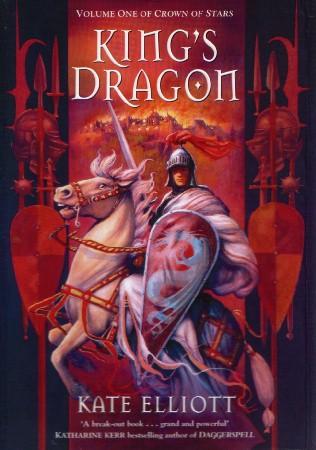I first read King’s Dragon, the opening book in Kate Elliott’s seven-volume epic fantasy sequence Crown of Stars, in the same year I started secondary school.
Returning to it after an interval of (give or take) thirteen years, I find an immense difference between my reactions as a thirteen-going-on-fourteen year old, and my reactions now, as an adult with more context for the genre. King’s Dragon is a novel very much in conversation with its predecessors and peers. It’s interesting to see it now as a very close contemporary of A Game of Thrones, in dialogue with so many of the same things—though due to the nature of publishing, while King’s Dragon succeeded A Game of Thrones chronologically, it’s impossible that the one could have influenced the other.
King’s Dragon’s main characters are Liath, a young woman with a mysterious background and some connection to sorcery, and Alain, a young man favoured by the Lady of Battles. The third and fourth characters who have a perspective on the action are Rosvita, a cleric and counsellor of King Henry of Wendar and Varre, and Hanna, Liath’s friend. But King’s Dragon is the first novel in a seven-volume epic fantasy arc, and its dramatis personae are appropriately many: from King Henry himself and Prince Sanglant, his bastard eldest son, to Sabella, the half-sister whose rebellion against his rule is aided by the senior cleric—and sorceress—Antonia. While Alain marches unwillingly in Antonia’s train, Liath finds herself in the city of Gent, besieged by the Eika from the north… and strongly attracted to Prince Sanglant.
In King’s Dragon, Kate Elliott has built an authentically medieval world, whose lineal relation to our history shows in the careful thought given to the king’s progress and his relation to his nobles; in the church of the Lord and Lady, its roots clearly owing much to Christianity and the early Greek church, with titles such as biscop and skopos; and in the lives of the ordinary people who are affected by the desires of the powerful and their wars—people like Liath and Alain.
For King’s Dragon is not a happy fluffy fantasy. It is, in fact, as grittily realistic as anyone might wish. At fourteen, it was the first time I had come across real intimate violence and sexual coercion in SFF, the first time the villains hadn’t been obvious, and wickedness swiftly condemned by everyone around the protagonists. From this distance, I can see that Elliott was engaged in showing a light on some of the things fantasy was still mostly inclined to gloss over: at fourteen, all I understood was that my reader-identification character was being abused by a monster.
It remained a very strong memory for me. I never finished reading Crown of Stars back then—I believe I was distracted by exams while waiting on the fifth book—and despite my best efforts to read faster I’m still only halfway through the series now. (Read it. If you like ASoIaF, or even if you don’t, read it.) What I was willing to read, to see, though, at the age of fourteen and now, has spurred me to think thoughts about the nature of reading experience and how it changes. Am I more prepared, as an adult, to read things that aren’t in some sense wish-fulfilment? Is that the major difference between Young Adult as a category and everything else, the depth of the average reader’s self-absorption? Or is it only me that’s changed, and am I extrapolating from too small a data-set?
Because King’s Dragon is so much more interesting a book to me now, both in its own right and in that I can see the things with which it’s in dialogue. It has flaws and absences—Elliott’s succeeding epic series present a much more diverse cast from the offing—but it’s a mature, intelligent book.
And brutal. It—and its sequels—still affects me quite viscerally, even knowing what was coming. Even after thirteen years.
I lift my hat to you, Kate Elliott. I really do.
Liz Bourke needs to read faster. Her blog. Her twitter.










